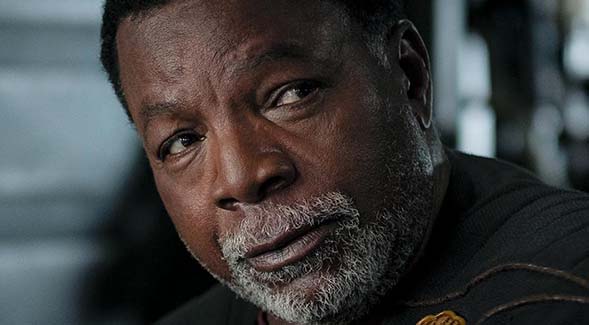A Q&A with Mandalorian Star Carl Weathers
The Emmy-nominated alumnus reflects on a career shaped by his time at SDSU.

An entirely new generation recognize him from his role as Greef Karga — the mysterious leader of the Bounty Hunters' Guild — in the critically acclaimed Disney+ Star Wars streaming series and pop culture juggernaut “The Mandalorian.” It’s the role that recently landed him his first Primetime Emmy nomination for best guest actor in a drama series. The 73rd Primetime Emmy Awards air Sept. 19 on CBS and the Paramount Network.
Weathers, who majored in theater arts and attended SDSU between 1968 and 1970, has carved out a following that crosses age and cultural boundaries over his 50-year career on the big screen and television, which followed a brief professional football career playing for the Oakland Raiders and later in the Canadian Football League. At SDSU, Weathers was an Aztecs linebacker and also starred in campus theater productions.
SDSU Newscenter’s Aaron Burgin spoke with Weathers about his Emmy nomination and his time at SDSU.
You’ve had such a storied career in acting. What does it mean to you to receive your first Emmy nomination now?
For me, what it means is that what I did was worthy of a nomination. It also probably means that I remain on the good side of enough people that my nomination would join the other nominations. Ultimately, it’s really just recognition, and recognition from one's peers is a really pleasant thing to have. It is a really affirming and confirming situation to be in. So, it feels good.
How has the experience been on “The Mandalorian?”
Once I signed on and got involved, the show really grew, my role grew and my participation grew, not only in front of the camera as an actor, but I also had the pleasure of directing an episode.
The development of my character was fantastic and, needless to say, the response has been phenomenal. No matter where I’ve gone, that audience is huge for “The Mandalorian.”
I’ve loved my time on the show; it has given me an opportunity to be creative in a much more complete way than I had been prior to in other projects. It has been a great experience, and it couldn’t have come at a better time.
What’s your Mount Rushmore of acting roles?
The roles I remember fondly, I remember fondly for different reasons. I am entertained by them. Chubbs in “Happy Gilmore” ... Apollo Creed, particularly in the first “Rocky,” because we were just laying the foundation. I didn’t know what the hell I was doing beyond being an actor and trying to co-create a great actor with the direction of John Avildsen. “Predator” has a nice place in there; there are a couple of scenes in there that I remember fondly when I see them — they just work.
And I really like Greef Karga in “The Mandalorian.” There are a few scenes that helped capture something about the character that was revelatory
What’s on the horizon for you professionally?
“The Mandalorian” is coming back for its third season. We start work in the fall.. I am also going to direct an episode of “Chicago Fire.” I’ve had to turn down some work because of how busy my schedule has worked out in the latter part of the year. It’s nice to be able to say that.
At what point do you think people began to look at you as an actor and not athlete-turned-actor?
See, that question begs for an answer that is a little complex. I started acting when I was in grade school, and I majored in theater while I was on a football scholarship. There was always a Jekyll and Hyde, well, actually I’ll just say a “split personality” between the artistic and the athletic, which I learned to love.
So there’s a portion of the audience that has no idea that I played football, let alone played in the NFL or the CFL and, for those people I am grateful that they are my fans. There are also those folks who are fans of Carl Weathers the athlete, and I am grateful for them.
What I am doing or have done was what was important to me at that time, and I do it because it’s what I want to do. I guess the entertainer in me wants to please people.
How did you prepare at SDSU for professional life and did you have mentors who helped?
There were people that I gravitated toward and instructors I gravitated toward. The theater department was really important because theater people are a family, and those instructors and professors and teachers were people that when they were contributing something that really sparked with who I am or who I was becoming, of course I gravitated toward them.
Professor (E. Kingsley) Povenmire – he was so important to so many of us, in particular those of us who were athletes. He taught us how to think beyond what we knew or what we learned, and he supported us in where we were.
Coaches were really important for young me, particularly in college, because I was learning how to walk through the world. We all come from various societal, economic, educational positions, and when you have someone in a leadership position who shows you respect and has enough of an in-charge personality and at the same time, in line with that, has a kind of generosity with that personality, those people mean so much.
Interview has been edited for length and clarity.



